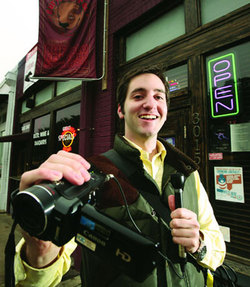MoJos in training: An alumnus is preparing journalism students for our multi-media world
 |
| Jordan Haygood, a senior news editorial major from White Oak, shot video and wrote stories for the class Multi-Platform Journalism, teaming with other students to examine alcohol in and around campus using new media technologies. |
Fort Worth, TX
4/6/2009
by Kathryn Hopper, TCU Magazine
Passing around a bag of M&Ms as they debate the best use of Google maps and possible blog entries, the students in Aaron Chimbel’s ’02 journalism class are on the vanguard of modern journalism.
Their weekly class meetings are not that different from the news meetings held across the country as editors and producers decide when and where to run stories.
But in Chimbel’s Multi-Platform Journalism class, students also debate how to cover a story using an ever-growing arsenal of new media technologies — from online video interviews to photo slideshows to blogs.
“For a long time, it was you either tell a story as a 1-minute, 30-second television piece or a 700-word newspaper story, but now there are so many more ways to convey information and engage users in the content,” said Chimbel, who also works as WFAA Channel 8’s mobile journalist, or MoJo for short, producing online sports stories for the station’s Web site.
“The students used a combination of video and still pictures, surveys, a quiz, text, a first-person account, raw interview excerpts, among other techniques,” he said. “The key thing is to do what fits the story. In some ways it’s very freeing because you’re not tied to having to report in one set way, but it also forces you to be more creative and think visually.”
This class assignment was straightforward — pick a topic and investigate it from different angles, using a variety of media platforms.
Chimbel’s rules were simple but sacred — be accurate, avoid clichés and never assume anything.
Students originally discussed delving into gang violence, but ultimately chose a topic closer to campus — alcohol. They hit the streets, interviewing police, university officials and fellow students.
The result is the investigative Web site Alcohol 101, which includes a survey of TCU tailgaters, Google maps pinpointing the local happy hours and video diaries of two students celebrating their 21st birthday — one who abstained from alcohol and another who binged.
Chimbel, who earned an undergraduate degree in broadcast journalism with a minor in sociology at TCU and a master’s degree in journalism from Columbia University, said his students were receptive to using new story forms.
“Since they haven’t been working in the field for years, they seem to feel much more freedom to tell stories in new ways,” he said. “Some of the most interesting work I’ve seen has been from students who find new ways to tell compelling stories.”
While he could have spent class time lecturing, his classes were more of a free-form exchange of ideas, with him occasionally asking students questions, a nod to the Socratic method.
“This class was much more up to the students,” he said. “In most classes the students come in and are told what to do and then go do it. In this course I thought it was important for the students to find something interesting to them and their peers and something they thought could sustain this coverage.
“The class was also an experiment. We had to grapple with new technology and figure out how to get things done. Really, most of the class and its direction was on the students to figure it out. I think that’s really good training for the real world of journalism today.”
Jordan Haygood, a senior news editorial major from White Oak, said the class is crucial training for the new media landscape.
“Our generation relies more on the Internet — that’s where we get our news,” he said. “It was great to have someone who is in the industry, who really knows the ins and outs, there to offer advice.”
Chimbel said the most important thing he learned as a student was good reporting, writing and storytelling skills.
“Those three things are critical,” he said. “The technology has changed and will continue to change. So, in the basic sense, I learned exactly what I needed and I picked up the technology along the way. It’s why I don’t teach a lot about the technology itself. I think it’s much more valuable to learn the principles of it all and then apply it, knowing you have to be adaptable.”
To see their work, go to moudyproject.tcu.edu.










